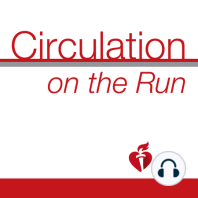17 min listen
Circulation February 9, 2021 Issue
ratings:
Length:
33 minutes
Released:
Feb 8, 2021
Format:
Podcast episode
Description
This week features Two Feature Discussions. In our first discussion, author Thomas Metkus and Guest Editor Allan Jaffe discuss the article "Myocardial Injury in Severe COVID-19 Compared to Non-COVID Acute Respiratory Distress Syndrome." Then in our second discussion, author Naveed Sattar and Guest Editor Ileana Piña discuss the article "Effect of Empagliflozin on Left Ventricular Volumes in Patients with Type 2 Diabetes, or Prediabetes, and Heart Failure with Reduced Ejection Fraction (SUGAR-DM-HF)." TRANSCRIPT BELOW Dr. Carolyn Lam: Welcome to Circulation on the Run, your weekly podcast, summary and backstage pass to the journal and its editors. We're your co-hosts, I'm Dr. Carolyn Lam, Associate Editor from the National Heart Center and Duke National University of Singapore. Dr. Greg Hundley: I'm Dr. Greg Hundley, Associate Editor, Director of the Pauly Heart Center at VCU Health in Richmond, Virginia. Dr. Carolyn Lam: Guess what? Double feature again, this episode with the first talking about empagliflozin and its effect on left ventricular volumes in patients with type two diabetes, pre-diabetes, and HFrEF, and this is the sugar DM heart failure study. Dr. Greg Hundley: Carolyn, the second of our double feature Tuesday is a paper that involves myocardial injury in severe COVID-19 compared to non-COVID acute ARDS. Well, let's grab a cup of coffee and Carolyn this week, I'm going to jump into my first paper, which comes to us from Dr. Are Kalstad from the University of Oslo at the Oslo University Hospital. Carolyn, this study tested the hypothesis that the daily addition of 1.8 grams of N-3 PUFA to standard of care, secondary prophylaxis in elderly patients who have survived a acute MI would reduce the risk of subsequent cardiovascular events during two years of follow-up. Dr. Carolyn Lam: Interesting, Greg and a clinically important question. So what did they find? Dr. Greg Hundley: Yes, Carolyn. They enrolled 1,027 subjects who were randomized in this investigator initiated, multi-center randomized clinical trial of adding that 1.8 grams of n-3 PUFA, 930 milligrams of EPA, and 660 milligrams of DHA versus placebo, which was a corn oil supplement, daily to the standard of care in 70 to 82 year old patients with recent, so within two to eight weeks, acute myocardial infarction. The authors found that they could not detect reduction in clinical events in these elderly patients with the recent acute EMI treated with the 1.8 grams of n-3 PUFAs daily for two years. So, a negative study, Carolyn. Dr. Carolyn Lam: Surely, we'll add to that debate that's just so interesting surrounding the PUFAs. But let's go onto another paper I want to tell you about, it provides novel insights into the complex crosstalk between the cardiac endothelial cells and cardiomyocytes during cardiac repair after myocardial infarction. This paper is from Dr. Taleb and colleagues from Park Inserm in France. Their study suggested a deleterious role for endothelial indoleamine 2,30-dioxygenase-1, which I'm now going to abbreviate as IDO, which is an enzyme involved in tryptophan catabolism. They found that the specific deletion of IDO in endothelial cells enhanced cardiomyocytes survival and contractility leading to cardiac function improvement. The IDO dependent effects were mediated by endothelial cell production of kynurenine. The study in essence found that therapeutic strategies targeting cardiac IDO could, in fact, constitute an innovative approach to curb cardiac dysfunction following MI. This was followed by an editorial by Drs. Ma and Wang from Thomas Jefferson University. Dr. Greg Hundley: Very nice, Carolyn. Great studies again from the world of basic science. Well, my next paper comes to us from Professor Gerasimos Filippatos from the University of Athens Hospital. Carolyn, this was a sub-study of the FIDELO-DKD trial that evaluated the effect of the nonsteroidal selective mineralocorticoid receptor antagonists finerenone on kidney and cardiovasc
Released:
Feb 8, 2021
Format:
Podcast episode
Titles in the series (100)
Circulation January 24, 2017 Issue: Circulation Weekly: Your Weekly Summary & Backstage Pass To The Journal by Circulation on the Run
